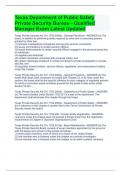Texas Department of Public Safety Private Security Bureau - Qualified Manager Exam Latest Updated
Texas Private Security Act CH. 1702.004(a) - General Provisions - ANSWER-(a) The board, in addition to performing duties required by other law or exercising powers granted by other law:
(1) licenses investigations companies and security services contractors;
(2) issues commissions to certain security officers;
(3) issues endorsements to certain security officers engaged in the personal protection of individuals;
(4) registers and endorses:
(A) certain individuals connected with a license holder; and
(B) certain individuals employed in a field connected to private investigation or private security; and
(5) regulates license holders, security officers, registrants, and endorsement holders under this chapter.
Texas Private Security Act CH. 1702.004(b) - General Provisions - ANSWER-(b) The board shall adopt rules necessary to comply with Chapter 53. In its rules under this section, the board shall list the specific offenses for each category of regulated persons for which a conviction would constitute grounds for the board to take action under Section 53.021.
Texas Private Security Act CH. 1702.005(a) - Department of Public Safety - ANSWER-
(a) The board created under Section 1702.021 is a part of the department. The department shall administer this chapter through the board.
Texas Private Security Act CH. 1702.005(b) - Department of Public Safety - ANSWER-
(b) A reference in this chapter or another law to the Texas Commission on Private Security means the board.
Texas Private Security Act CH. 1702.006 - Foreign Entity Registration - ANSWER-
Licensure under this chapter does not exempt a foreign entity from the registration requirements of Chapter 9, Business Organizations Code.
Texas Private Security Act CH. 1702.021(a) - Board Membership - ANSWER-(a) The Texas Private Security Board consists of seven members appointed by the governor with the advice and consent of the senate as follows:
(1) three public members, each of whom is a citizen of the United States;
(2) one member who is licensed under this chapter as a private investigator;
(3) one member who is licensed under this chapter as an alarm systems company; (4) one member who is licensed under this chapter as the owner or operator of a guard company; and
(5) one member who is licensed under this chapter as a locksmith.
Texas Private Security Act CH. 1702.021(b) - Board Membership - ANSWER-b) Appointments to the board shall be made without regard to the race, color, disability, sex, religion, age, or national origin of the appointee.
Texas Private Security Act CH. 1702.023 - Eligibility of Public Members - ANSWER-The
board's public members must be representatives of the general public. A person may not be a public member of the board if the person or the person's spouse:
(1) is registered, commissioned, certified, or licensed by a regulatory agency in the field of private investigations or private security;
(2) is employed by or participates in the management of a business entity or other organization regulated by or receiving money from the board;
(3) owns or controls, directly or indirectly, more than a 10 percent interest in a business entity or other organization regulated by or receiving money from the board; or
(4) uses or receives a substantial amount of tangible goods, services, or money from the board other than compensation or reimbursement authorized by law for board membership, attendance, or expenses.
Texas Private Security Act CH. 1702.024(a) - Membership and Employee Restrictions - ANSWER-(a) In this section, "Texas trade association" means a cooperative and voluntarily joined association of business or professional competitors in this state designed to assist its members and its industry or profession in dealing with mutual business or professional problems and in promoting their common interests.
Texas Private Security Act CH. 1702.024(b) - Membership and Employee Restrictions - ANSWER-(b) A person may not be a board member, and may not be a department employee whose primary duties include private security regulation and who is employed
in a "bona fide executive, administrative, or professional capacity," as that phrase is used for purposes of establishing an exemption to the overtime provisions of the federal
Fair Labor Standards Act of 1938 (29
U.S.C. Section 201 et seq.), and its subsequent amendments, if:
(1) the person is an officer, employee, or paid consultant of a Texas trade association in
the field of private investigation or private security; or
(2) the person's spouse is an officer, manager, or paid consultant of a Texas trade association in the field of private investigation or private security.
Texas Private Security Act CH. 1702.024(c) - Membership and Employee Restrictions - ANSWER-(c) A person may not be a board member or act as general counsel to the board or agency if the person is required to register as a lobbyist under Chapter 305, Government Code, because of the person's activities for compensation on behalf of a profession related to the operation of the agency. Texas Private Security Act CH. 1702.025(a) - Terms; Vacancies - ANSWER-(a) The board members serve staggered six-year terms, with the terms of two or three members
expiring on January 31 of each odd-numbered year.
Texas Private Security Act CH. 1702.025(b) - Terms; Vacancies - ANSWER-(b) If a vacancy occurs during the term of a board member, the governor shall appoint a new member to fill the unexpired term.
Texas Private Security Act CH. 1702.026(a) Officers - ANSWER-(a) The governor shall designate one board member as presiding officer to serve in that capacity at the will of the governor. The governor shall designate the presiding officer without regard to race, creed, color, disability, sex, religion, age, or national origin.
Texas Private Security Act CH. 1702.026(b) - Officers - ANSWER-(b) The board shall elect from among its members an assistant presiding officer and a secretary to serve two- year terms beginning on September 1 of each odd- numbered year.
Texas Private Security Act CH. 1702.026(c) - Officers - ANSWER-(c) The presiding officer of the board or, in the absence of the presiding officer, the assistant presiding officer shall preside at each board meeting and perform the other duties prescribed by this chapter.
Texas Private Security Act CH. 1702.027(a) - Grounds for Removal - ANSWER-(a) It is a ground for removal from the board that a member:
(1) does not have the qualifications required by Section 1702.021 at the time of taking office;
(2) does not maintain the qualifications required by Section 1702.021 during service on the board;
(3) is ineligible for membership under Section 1702.023 or 1702.024;
(4) cannot, because of illness or disability, discharge the member's duties for a substantial part of the member's term; or
(5) is absent from more than half of the regularly scheduled board meetings that the member is eligible to attend during a calendar year without an excuse approved by a majority vote of the board.
Texas Private Security Act CH. 1702.027(b) - Grounds for Removal - ANSWER-(b) The validity of an action of the board is not affected by the fact that it is taken when a ground
for removal of a board member exists.
Texas Private Security Act CH. 1702.027(c) - Grounds for Removal - ANSWER-(c) If the chief administrator has knowledge that a potential ground for removal exists, the chief administrator shall notify the presiding officer of the board of the potential ground. The presiding officer shall then notify the governor and the attorney general that a potential ground for removal exists. If the potential ground for removal involves the presiding officer, the chief administrator shall notify the next highest ranking officer of the board, who shall then notify the governor and the attorney general that a potential ground for removal exists.
Texas Private Security Act CH. 1702.028(a) - Per Diem; Reimbursement - ANSWER-(a)
A board member is entitled to a per diem as set by legislative appropriation for each day
the member engages in the business of the board.
Texas Private Security Act CH. 1702.028(b) - PerDiem; Reimbursement - ANSWER-(b) A member is entitled to reimbursement for travel expenses incurred while conducting board business, including expenses for transportation, meals, and lodging, as prescribed by the General Appropriations Act.
Texas Private Security Act CH. 1702.029 - Meetings - ANSWER-The board shall meet at regular intervals to be decided by the board.
Texas Private Security Act CH. 1702.030(a) - Training - ANSWER-(a) A person who is appointed to and qualifies for office as a board member may not vote, deliberate, or be counted as a member in attendance at a board meeting until the person completes a training program that complies with this section.
Texas Private Security Act CH. 1702.030(b) - Training - ANSWER-(b) The training program must provide the person with information regarding:
(1) this chapter;
(2) the programs operated by the board;
(3) the role and functions of the board;
(4) the rules of the board, with an emphasis on the rules that relate to disciplinary and investigatory authority;
(5) the current budget for the board;
(6) the results of the most recent formal audit of the board;
(7) the requirements of:
(A) the open meetings law, Chapter 551, Government Code;
(B) the public information law, Chapter 552, Government Code;
(C) the administrative procedure law, Chapter 2001, Government Code; and
(D) other laws relating to public officials, including conflict of interest laws; and
(8) any applicable ethics policies adopted by the board or the Texas Ethics Commission.
Texas Private Security Act CH. 1702.030(c) - Training - ANSWER-(c) A person appointed to the board is entitled to
Page 7 of 44
reimbursement, as provided by the General Appropriations Act, for the travel expenses incurred in attending the training program regardless of whether the attendance at the program occurs before or after the person qualifies for office.
Texas Private Security Act CH. 1702.041(a) - Chief Administrator - ANSWER-(a) The chief administrator is responsible for the administration of this chapter under the





